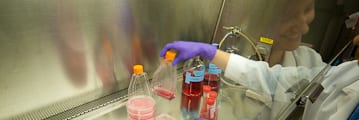
Karen E. Wetterhahn was a professor of chemistry at Dartmouth College and the founding director of Dartmouth’s Toxic Metals Superfund Research Program. An expert in the mechanisms of metal toxicity, Professor Wetterhahn was best known for her research on chromium, but also conducted significant research on mercury. She became ill and died in 1997, at the age of 48, as a result of a tragic laboratory accident involving a highly toxic mercury compound.
In addition to her international reputation as a research chemist, Professor Wetterhahn was known to students and colleagues at Dartmouth College as a dedicated teacher and mentor. At the time of her death in 1997 she was Dartmouth’s Albert Bradley Third Century Professor in the Sciences.
Trained as an inorganic chemist, Professor Wetterhahn also had expertise in biochemistry and molecular toxicology. Her primary research involved understanding how chromium and nickel cause cancer in humans. She was particularly interested in the way cells metabolize those metals.
In 1995, Professor Wetterhahn initiated Dartmouth’s Toxic Metals Superfund Research Program, an interdisciplinary project exploring the human health effects of metals that are common contaminants in the environment, especially at toxic waste sites. The program, supported by a grant from the National Institute of Environmental Health Sciences, draws together scientists from Dartmouth College and the Geisel School of Medicine at Dartmouth, as well as many collaborators and co-leaders from other academic institutions.
 Professor Wetterhahn played an integral role in the administration of the sciences at Dartmouth. As Dean of Graduate Studies (1990), Associate Dean of the Faculty for the Sciences (1990-94), and Acting Dean of the Faculty of Arts and Sciences (1995) she helped guide the growth and development of the science division and its graduate programs. She was instrumental in developing a curriculum on the life-science area known as structural biology, which studies the structure of biologically active molecules such as DNA, RNA and proteins to learn how they function and interact.
Professor Wetterhahn played an integral role in the administration of the sciences at Dartmouth. As Dean of Graduate Studies (1990), Associate Dean of the Faculty for the Sciences (1990-94), and Acting Dean of the Faculty of Arts and Sciences (1995) she helped guide the growth and development of the science division and its graduate programs. She was instrumental in developing a curriculum on the life-science area known as structural biology, which studies the structure of biologically active molecules such as DNA, RNA and proteins to learn how they function and interact.
Professor Wetterhahn also worked to increase the number of women participating in the sciences and was co-founder of Dartmouth’s Women in Science Project, which provides research internships for first-year women science majors, along with other programs of academic and professional support. She was active in the Women in Cancer Research group and similar national organizations that encourage women to pursue research careers.
Professor Wetterhahn received her bachelor’s degree, magna cum laude, from St. Lawrence University in 1970 and her doctorate from Columbia University in 1975. She joined the faculty of Dartmouth in 1976, following a year as a National Institutes of Health trainee at the Institute of Cancer Research, Columbia University College of Physicians and Surgeons.
She was an Alfred Sloan Fellow from 1981 to1985, and St. Lawrence University honored her in 1989 with the Alumni Citation in science and education. She was also a trustee of the Montshire Museum of Science.
The author of more than 85 research papers, Professor Wetterhahn was a member of several scientific societies and a past officer of the American Association for Cancer Research. She was also on the editorial board of numerous scientific journals. She trained 14 postdoctoral research associates, 20 graduate students and over 50 undergraduate research students in her laboratory.
 In 1996, while preparing an experiment that involved the use of dimethyl mercury, Professor Wetterhahn spilled a few drops of the compound on her gloved hand. Though the latex gloves she was wearing were believed to be protective, they proved to be inadequate in preventing exposure to this potent form of mercury. Unknown to Professor Wetterhahn, the toxin passed through the glove and was absorbed into her system. Six months later, she slipped into a coma and died from acute mercury poisoning.
In 1996, while preparing an experiment that involved the use of dimethyl mercury, Professor Wetterhahn spilled a few drops of the compound on her gloved hand. Though the latex gloves she was wearing were believed to be protective, they proved to be inadequate in preventing exposure to this potent form of mercury. Unknown to Professor Wetterhahn, the toxin passed through the glove and was absorbed into her system. Six months later, she slipped into a coma and died from acute mercury poisoning.
Dartmouth has established several memorials in honor of Karen Wetterhahn, including a graduate fellowship in chemistry and an annual faculty award for distinguished creative or scholarly achievement. A library reading room and the annual undergraduate science symposium have also been named in her honor, and her portrait now hangs in Dartmouth’s Baker-Berry Library.
The National Institute of Environmental Health Sciences created an award in her honor shortly after her death, which has been won by several Dartmouth students Angeline Andrew, Anne Spuches, Roxanne Karimi and Courtney Kozul-Horvath. (see full list of recipients)